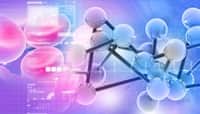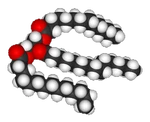Lipid Worksheets

Lipid worksheets and macromolecule worksheet lesson plans designed for high school and middle school life science teachers are downloadable here for free. Macromolecule labs include carbohydrate and lipid assay testing. Monomer polymer worksheet that helps sstudents build their macromolecule vocabulary in also included. Click the Free Lesson Plan (PDF) link below or become a member to get access to the answer key and editable file. Free lipid curriculum includes:
-

Lipid Worksheet  Free Lesson Plan (PDF)
Free Lesson Plan (PDF)
Lesson Plan (DOCX) & Answer Key with Membership
High School Worksheet
In this lipid worksheet, students do a deep dive into the structure and functions of different lipids, specifically cell membranes, and triglycerides. The chemical structure of glycerol and fatty acids is provided to build triglycerides and phospholipids. Students also learn about single bonds and double bonds to create saturated vs unsaturated fatty acids.NGSS Standard
HS-LS1-6
Published by NGSS Life Science
-

Biomolecules Test Question Bank  Free Lesson Plan (PDF)
Free Lesson Plan (PDF)
Lesson Plan (DOCX) & Answer Key with Membership
High School Test
Question bank to build assessments. An active membership is required to view questions.NGSS Standard
HS-LS1-6
MS-LS1-7 (Metabolism)
Published by NGSS Life Science
-

Macromolecule Lab - Organic Compound Mystery Free Student Handout
Free Teacher Notes
High School Lab
In this macromolecule lab, students learn about the three food-based biomolecules by testing for triglycerides, glucose, starch, and proteins. Students will use indicator solutions like test strips, paper bag stain test, iodine, and Biuret solution. Students experiment on the following mystery substances: vegetable oil, glucose, corn starch, powdered egg whites, and water.NGSS Standard
HS-LS1-6
Published by Ingrid Waldron and Jennifer Doherty
-

Biomolecule Worksheet  Free Lesson Plan (PDF)
Free Lesson Plan (PDF)
Lesson Plan (DOCX) & Answer Key with Membership
High School Worksheet
Students answer introductory questions about the four main biomolecules. Topics include carbohydrates, mono - poly saccharides, lipids, saturated, proteins, amino acids, nucleic acids, polymers and monomers.NGSS Standard
HS-LS1-6
Published by NGSS Life Science
-

Lipid Lab - Hydrogen Bonding  Free Lesson Plan (PDF)
Free Lesson Plan (PDF)
Lesson Plan (DOCX) & Answer Key with Membership
High School Lab
Students examine the properties of water by dropping water onto a penny. Students will be able to explain how the cell membrane, a lipid, can be used to separate the cell from its environment in order to run its own metabolism.NGSS Standard
HS-LS1-6
Published by NGSS Life Science
-

Biomolecules Lecture Notes  Free Lesson Plan (PDF)
Free Lesson Plan (PDF)
Lesson Plan (PPTX) & Answer Key with Membership
High School Lecture
This PowerPoint is an introduction to making polymers from monomers (dehydration synthesis) and breaking of polymers into monomers (hydrolysis). The notes also focus on converting one macromolecule into different macromolecule.NGSS Standard
HS-LS1-6
Published by NGSS Life Science
-

Properties of Water Lab  Free Lesson Plan (PDF)
Free Lesson Plan (PDF)
Lesson Plan (DOCX) & Answer Key with Membership
High School Lab
In this chemistry lab, students examine the properties of water by dropping water onto a penny. Students will be able to visually see how hydrogen bonding causes the cohesion of water by the formation of a water bubble on top of the penny. At the end of the lab, students will graph their results.NGSS Standard
Published by NGSS Life Science
